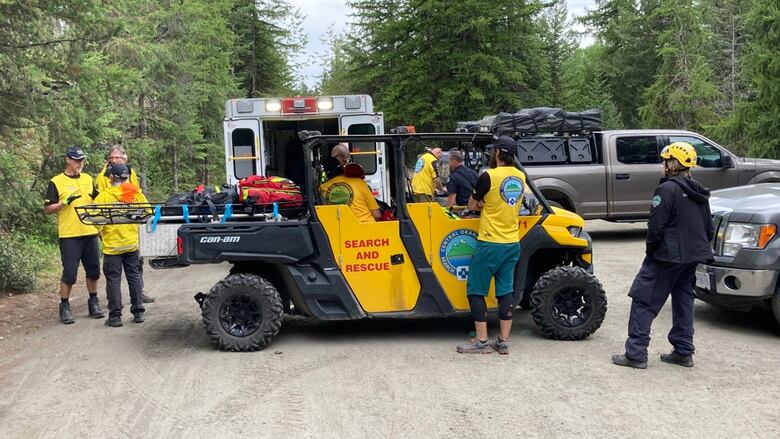Take extra caution in backcountry, says search-and-rescue volunteer after busiest month on record
'Be prepared and know where you're going and what you're going to need when you get out there'

Duane Tresnich has been dedicated to helping people with Central Okanagan Search and Rescue (COSAR) for more than a decade, but July was the most stressful he's experienced as a volunteer for the group.
On Tuesday, Aug. 1, COSAR said July 2023 has been its busiest month since being established in 1954.
The month included six medical rescues; five wilderness searches; three calls to help other search-and-rescue groups; three urban searches for people with dementia and helping with evacuations for the Knox Mountain wildfire, just north of downtown Kelowna.
It adds up to a total of 18 tasks compared to the previous record of 12 in May 2022.
Tresnich, a search manager, says accidents are not people's fault, but he hopes people will exercise extra caution when exploring the backcountry.
"Some of our sister groups do a lot of mountain rescues because people go hiking in sandals, and then once they get up high, they realize that the snow is falling or they're in shorts.
"Be prepared and know where you're going and what you're going to need when you get out there."

While the rescue group doesn't provide a detailed breakdown of the calls they respond to, they say the incidents are diverse and can occur throughout the year, including winter rescues in severe cold conditions and multi-day searches on Okanagan Lake for missing swimmers.
Ed Henczel, a team leader with COSAR and also a communications professor at Okanagan College, said last year that the surge in emergency cases is most likely related to the COVID-19 pandemic.
Starting in 2020, more people got into the habit of taking outdoor excursions due to pandemic restrictions over indoor gatherings. That trend appears to have continued, but so has another where people are going out, but not necessarily prepared.
Search and rescue groups in B.C. advise people heading to the backcountry to carry essential items, which include a personal locator beacon in case there is no cellphone coverage. They're also asking people to make detailed trip plans that include telling others where they are heading and when they will return and to undertake training, such as avalanche survival training.
COSAR says it's the oldest among the 78 ground search-and-rescue groups across the province. It primarily serves the Central Okanagan region, which includes Kelowna, West Kelowna, Lake Country, and Peachland.
The volunteer organization also provides backcountry emergency services to a wider area, from Vernon in the north to Rock Creek in the south, and from Big White in the east to Merritt in the west.
According to the B.C. government, before volunteers begin working with search-and-rescue groups, they must complete a training program designed by the Justice Institute of B.C., which covers first aid, navigation skills and wilderness survival courses.
Tresnich says while all 56 volunteers returned safely from July's calls, some of their tasks were traumatic, and some volunteers required emotional support afterward.
"We talk among ourselves most of the time after practice — we'll get together and socialize afterwards," he said, adding that his group could also meet with counsellors through the B.C. Search and Rescue Association.
With files from Radio West and Chad Pawson